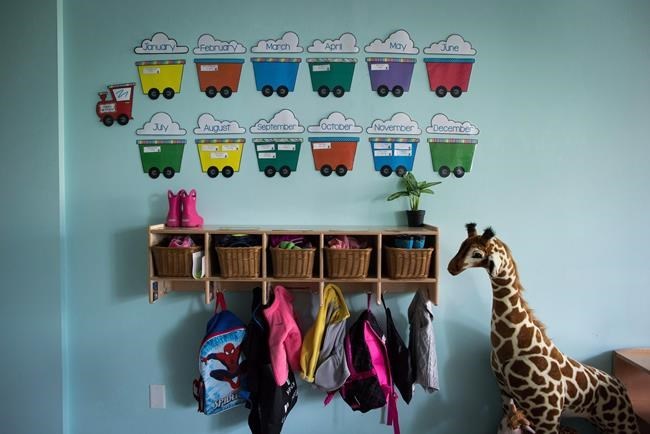TORONTO — Early childhood educators in Ontario are among the lowest paid in the country and raising their wages is critical to the success of the $10-a-day child-care program, advocates say.
Part of the agreement Ontario signed with the federal government in joining the national program was setting a wage floor of $18 an hour in 2022 and increasing it by $1 a year up to $25.
The current rate of $19 an hour makes the effective minimum wage the third lowest in the country, ahead of Saskatchewan and Northwest Territories, according to a policy paper released Tuesday by the Association of Early Childhood Educators Ontario and the Ontario Coalition for Better Child Care.
Many child-care centres across the province are limiting enrolment or closing rooms because of a staffing shortage primarily driven by the low wages, said Alana Powell, executive director of the ECE association.
"We want to remind the Ontario government they need to show they care about ECEs and child-care workers by immediately raising wages," she said at a news conference.
"That is the only way we can retain ECEs in the sector, re-attract those who have left and recruit more skilled educators to the field."
The two groups are calling for a salary scale of at least $30 to $40 an hour for registered ECEs and at least $25 an hour for non-ECE staff, who are about 40 per cent of the workers in licensed child care.
Education Minister Stephen Lecce said he will be announcing a workforce strategy this fall that will include a wage enhancement for ECEs, though he didn't divulge specifics.
"We do appreciate that there is a great deal of pressure on the workforce, there's a great deal of staff leaving the workforce within five years," he said.
"We're going to be bringing forth a plan that will demonstrate respect for the workers and I think give them an incentive to stay because we need them in order to grow our economy and to help women get into the labour market in the first place."
Lecce would not say if the plan will include a wage floor or grid for non-ECE staff.
Early childhood educators would also like to see the workforce strategy include non-compensation items such as a robust professional learning strategy and paid time to plan programming, Powell said. But the main thing she said she hears from ECEs is the need for higher wages, along with benefits and pensions.
Rachel Neville said she felt forced to leave her job as an ECE in licensed child care because she was earning $18 an hour and couldn't afford to take the bus to and from work multiple times a day for her split shift.
"Leaving my job felt like I was betraying myself and the children and families that I cared for," she said at Tuesday's press conference.
"I desperately wanted to keep that part of myself alive, stay in the field, but it felt like the child-care system was ruining my life and the low wages left me with this impossible decision. It was so unfair that on the last day of work, I had to look at the toddlers and tell them I wasn't coming back."
Child-care centres have traditionally relied on parent fees to largely fund operations, including staff wages, but under the $10-a-day program they cannot raise fees, and have asked the province to fund raises for ECEs to attract and retain them.
The YMCA told the provincial government during workforce consultations last winter that due to staff shortages, none of its child-care locations provincewide operate at full licensed capacity. It would need nearly 3,000 more staff to do that, and almost 3,500 to expand by 20 per cent.
Ministry documents from the start of the consultations show that officials estimate the province could be 8,500 ECEs short by 2026.
And while the province plans to create 86,000 new child-care spaces, Ontario's financial accountability officer has estimated the additional demand spurred by lower fees will outpace the current expansion plans by more than 220,000 spaces by 2026.
This report by The Canadian Press was first published Oct. 17, 2023.
Allison Jones, The Canadian Press

